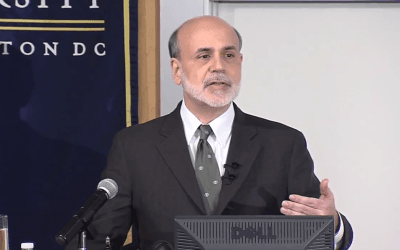The government is continuously over promising and under delivering.
MARKETS
What’s in the Vault?
Many have understandably sensed that central banks may well have acted to allow bullion banks to take out massive naked short positions in precious metals in order to drive down the price.
Lessons From the Bankruptcy of Detroit
Private enterprise built America’s Motor City; government destroyed it.
One CEO’s Dilemma: “But I don’t want to be moral!”
The moral is the practical—that is the reason why you want to be moral.
“You Are Not That Good”– Why Business Leaders Need Pride, not Humility
Instead of humility that the “you are not that good” remark is trying to admonish, an effective business leader needs to embrace the moral principle of pride: the policy of doing one’s best.
A shareholder-employee conflict?
Marx was wrong: shareholders will benefit, not from the exploitation of workers but from their motivated, productive, fairly-compensated contribution to wealth creation. It is not a win-lose but a win-win; the alleged conflict between shareholders and workers is a myth.
The Golden Cycle
The New York Times had the definitive take on the vicious sell off in gold. To summarize one of their articles: Two years ago gold bugs ran wild as the price of gold rose nearly six times. But since cresting two years ago it has steadily declined, almost by half,...
Economics vs. ‘Need’
One of the most common arguments for allowing more immigration is that there is a "need" for foreign workers to do "jobs that Americans won't do," especially in agriculture. One of my most vivid memories of the late Armen Alchian, an internationally renowned economist...
Understanding Gold Market Dynamics
To an extent that reveals a thorough misunderstanding of the market forces, the financial media has failed to consider the different motivations and beliefs that drive the different types of investors who are active in the gold market. By treating the gold market as...
The Great Reflation
This week economists, investors and politicians were treated to some of the "best" home price data since the frothy days of 2006 when home loans were given out like cotton candy and condo flipping was a national pastime. The Case-Shiller 20 City Composite Home...
The Value of Free-Market Competition
It is wrong of governments to interfere with markets, whether through protectionism or other regulations restricting our freedom to trade and compete.
The Biggest Loser Wins
While the world's economies jockey one another for the lead in the currency devaluation derby, it's worth considering the value of the prize they are seeking. They believe a weak currency opens the door to trade dominance, by allowing manufacturers to undercut foreign...
Gold Recovers Amidst Uncertainty
The selloff in gold that captured the world's attention in mid-April has revealed some truths about how the market trades and the sentiments of many of the investors who have piled into the trade over the past few years. While the correction does highlight a higher...
Business Hero John Allison: BB&T — The Bank That Atlas Built
Ayn Rand asked the question, “Philosophy: who needs it”? Allison and BB&T have proven that businesses need philosophy — Ayn Rand’s philosophy.
Gold in the Crosshairs
In the opening years of the last decade, most mainstream investors sat on the sidelines while "tin hat" goldbugs rode the bull market from below $300 to just over $1,000 per ounce. But following the 2008 financial crisis, when gold held up better than stocks during...
Price Versus Cost: The Destructive Nature of Taxes
If taxes only concealed hidden costs of what we buy, we’d be lucky, but taxes are destructive in another hidden way.
Is Outsourcing a Moral Practice?
RBC and any other company should be free to outsource as much as they want—because it is moral.
Corporate Welfare is Immoral
In its recently released budget the Canadian (Conservative!) government announced $6.4 billion of new corporate welfare spending. The aerospace sector will receive $1.2 billion of it over the next five years, Federal Economic Development Agency for Southern Ontario...
Can It Happen Here? Cyprus Government Confiscates Cash From Private Bank Accounts
After going back and forth, the government of Cyprus ultimately decided, under international pressure, to go ahead with its plan to raid people’s bank accounts. But could similar policies be imposed in other countries, including the United States?
The Fallacy of “Living Wage”
The fundamental issue is not wage rates, but productivity. If a worker desires a higher wage, he must produce more in a given period of time.
Gentlemen, Start Your Presses: The Bernanke Virus Spreads Across the World
The past few months illustrate a serious spread of Bernanke’s policies across the entire developed world.
The Economic System That Time Forgot
Rubio perpetuates exactly what’s wrong. He assumes, like Obama, that what we have is a mostly free enterprise system. But we don’t.
Ben’s Balance Sheet Blues
The Fed has no credible exit strategy.
FED’s Tightening Pipe Dream
There is no exit strategy because the results of the Fed withdrawing its artificial support would be disastrous for the US Treasury and in the short-term, the US economy.
Subscribe for free.
Latest pro-Capitalism goodness sent weekly to your email box.
No spam. Unsubscribe anytime.






